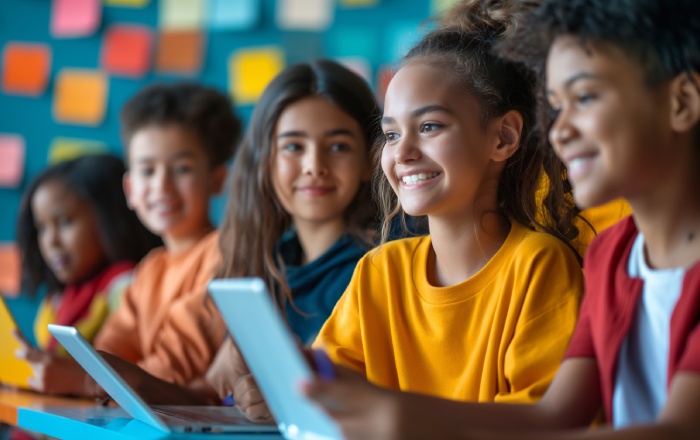Nov 28 2024
What Are the Top Trends in 2025 for Inclusive and Accessible Education?

Director of Business Development

Nov 28 2024

Director of Business Development

As we move into 2025, inclusive and accessible education is more than a priority—it’s a necessity. Education should be a gateway for all, and in a world increasingly driven by digital tools, ensuring digital accessibility in education is critical to bridging learning gaps.
For students with differing abilities and those from underserved communities, accessibility can be the difference between thriving and being left behind. The urgency for accessible EdTech in schools continues to grow as technology reshapes learning experiences, demanding that educators adopt solutions that make learning inclusive for every student.
This blog explores the top trends in inclusive and accessible education that are set to shape the future of learning in 2025.
1. Expanding Assistive Technology Integration
Assistive technologies are advancing rapidly, transforming the learning experience for students with differing needs. Voice-activated software, screen readers, and augmented communication devices are becoming classroom staples.
In 2025, the focus will be on integrating these technologies seamlessly across various educational platforms. Schools will continue to adopt tools like text-to-speech software and alternative input devices to empower students with differing needs, making classrooms more inclusive.
Newer applications of AI-powered voice recognition can enhance real-time assistance for students with mobility issues or those who face learning disabilities like dyslexia. By embedding these tools into existing digital platforms, schools can make learning materials accessible to a wider audience without disrupting traditional classroom setups.
2. Personalised Learning Pathways for Inclusive Education
Personalisation in education is increasingly recognised as a key to inclusive learning. Through adaptive learning algorithms, digital platforms can now tailor educational content to the unique needs of each student.
In 2025, we’ll see more schools implementing personalised learning pathways that adjust based on real-time student performance. This level of customisation helps educators support students who may need additional guidance or specialised materials, contributing to a more inclusive learning environment.For example, visual aids for visual learners or auditory prompts for those with hearing impairments make it easier for educators to address diverse learning needs.
3. Increased Focus on Accessibility Compliance Standards
With the legal landscape around digital accessibility in education evolving, schools are under pressure to meet higher compliance standards. Accessibility guidelines such as the Web Content Accessibility Guidelines (WCAG), will become crucial benchmarks in 2025.
These standards will help ensure that all digital educational materials, from curriculum design to multimedia content are usable by students of all abilities. Compliance with these standards will not only enhance digital accessibility but will also protect institutions from potential legal liabilities.
4. Leveraging AI for Inclusive Content Creation
Artificial intelligence is already soaring as a powerful tool for creating inclusive content. AI-driven platforms can generate closed captions, translate content for multilingual learners, and even produce accessible formats like braille or high-contrast displays.
In 2025, the use of AI to automate these processes will become standard practice in schools, enabling educators to provide inclusive learning solutions without extensive manual effort.
For example, an AI tool that automatically generates closed captions and audio descriptions for video lectures can help hard-of-hearing students access content alongside their peers, making EdTech more accessible and effective.
5. Expanding Remote and Hybrid Learning Options
Remote and hybrid learning options have shown significant promise in providing accessible education, particularly for students in rural areas or those with disabilities that limit in-person attendance.
In 2025, digital platforms designed to support remote learning will increasingly prioritise accessibility, ensuring that all students can participate fully. Accessible EdTech for schools will play a pivotal role in making sure that these platforms support diverse learning styles and needs.
MRCC EdTech is committed to supporting schools and educational institutions as they adapt to these emerging trends. Our accessible EdTech solutions for schools are designed to foster inclusivity and provide all students with an equal opportunity to learn and succeed.
Challenges and Solutions
One of the primary challenges facing schools is the integration of accessible digital tools without disrupting existing workflows. At MRCC EdTech, we offer seamless learning solutions that enable schools to build inclusivity directly into their digital environments. Our diverse range of digital accessibility learning solutions ensures that your school can meet and exceed accessibility standards while delivering high-quality education.
MRCC EdTech’s Solutions Include:
The year 2025 promises to be transformative for inclusive and accessible education, with new technologies and approaches making it easier for schools to reach every learner. MRCC EdTech stands at the forefront of this movement, offering schools accessible EdTech that not only meets compliance standards but also actively enhances the learning experience for all students. Ready to make your school a leader in inclusive education? Contact MRCC EdTech today!
Leave A Reply
Your email address will not be published. Required fields are marked *